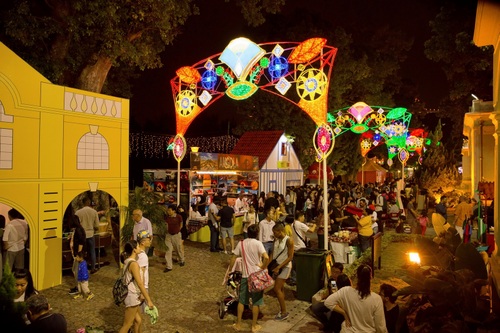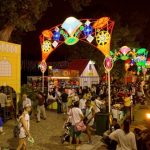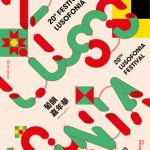 20th Lusofonia Festival
20th Lusofonia Festival
Organized by the Cultural Affairs Bureau (IC, from the Portuguese acronym) and the Permanent Secretariat of Forum for Economic and Trade Co-operation between China and the Portuguese-speaking Countries (Macao), and co-organized by the Macao Government Tourism Office and the Civic and Municipal Affairs Bureau, the 20th Lusofonia Festival kicks off on Thursday, 19 October, and will run from 19 to 22 October, at the Taipa Houses for four consecutive days, introducing Macao’s unique lusophone culture. Residents and tourists are welcome to participate and experience the warm lusophone atmosphere.
This year marks the 20th anniversary of the Lusofonia Festival. In order to allow the public to have a deeper understanding of the rich local lusophone culture, the duration of the event has been extended to four days, offering a diversified programme of performances. During the Festival, the Amphitheatre of the Taipa Houses hosts performances by nine Portuguese-speaking countries and regions, namely Angolan Yola Semedo’s kizomba, the catchy tunes of the accordion of Brazilian ensemble Rastapé and the first stage collaboration between Trio Hélio Batalha, Sílvia Medina and Ellah Barbosa, all from Cape Verde. In addition, there are solo performances by Portuguese singer Diogo Piçarra, Haylton Dias from São Tomé and Príncipe and singer from Guinea-Bissau Klim Mota; as well as group performances by True Blue from Goa Daman and Diu, Os Kassimbos from Mozambique and the Solution Band from East Timor. There will also be a folk dance performance by the Guangxi Zhuang Autonomous Region Folk Troupe. Aside from the cheerful atmosphere at the Amphitheatre, the public will also be able to enjoy Portuguese delicacies and listen to music in Portuguese performed by Portuguese-speaking art groups at the Carmo Square.
In addition to the extraordinary performances, the Festival also features traditional gastronomy and a variety of stands. During the Festival, temporary restaurants serving Portuguese flavour and dishes are hosted at the Carmo Garden and the Carmo Square, including not only the typical Portuguese specialties and grilled food, but also traditional delicacies from each region, such as cachupa from Cape Verde, the Brazilian pork with black beans, curry chicken from Goa Daman and Diu, Angolan Moamba and Mancara soup from Guinea-Bissau, among others. The Festival also features stands of Macao’s Portuguese-speaking communities from ten countries or regions, namely Angola, Brazil, Cape Verde, Guinea-Bissau, Goa Daman and Diu, Mozambique, Portugal, São Tomé and Príncipe, Macao and East-Timor, as well as a handcraft stand from the Guangxi Zhuang Autonomous Region, introducing their countries or regions’ traditional music, photographs, arts and crafts and costumes.
In terms of recreation, visitors of all ages can participate in traditional Portuguese games and table football tournaments, as well as experience the sensations of the Guia Circuit through a Macau Grand Prix Simulator; while children can take photographs and take pony rides, as well as participate in various children’s games. A radio station will be installed on site to broadcast Portuguese music throughout the day.
The 20th Lusofonia Festival offers lots of animation and joy through a diversified programme to the public. All residents and tourists are welcome to participate and experience the festive atmosphere. For more information, please visit IC’s website at www.icm.gov.mo or call IC through tel. no. 8397 3702, during office hours.
View gallery







